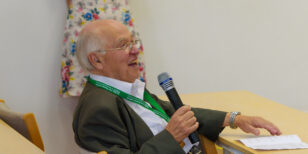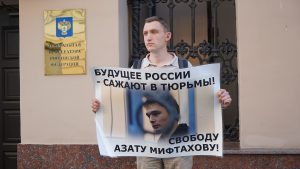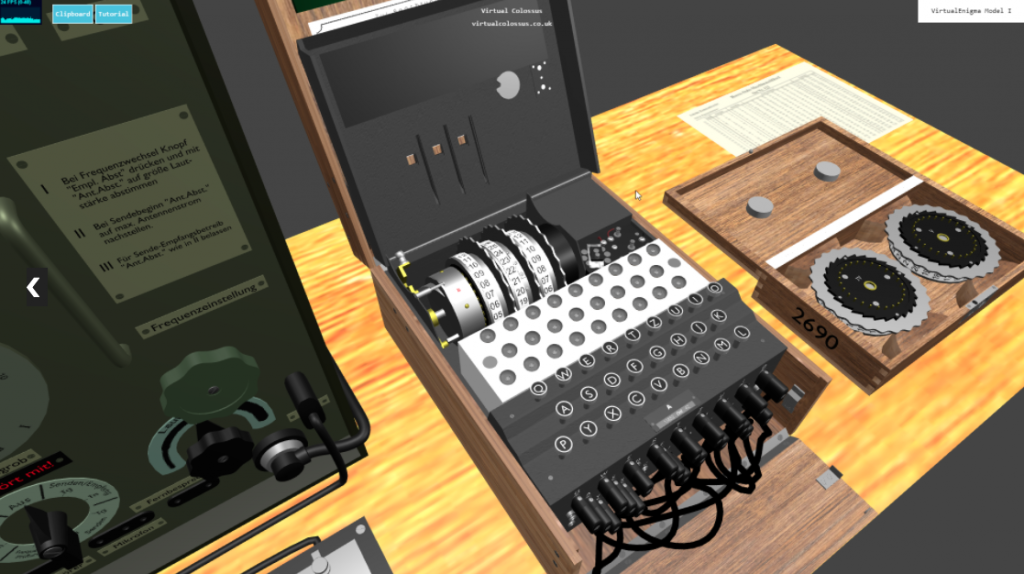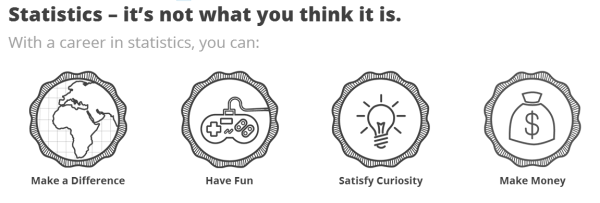It’s been a busy few months! As per our name, here’s an aperiodically-timed round up of things that have happened in the world of maths in the last few months.
You're reading: Posts Tagged: Royal Society
- Fields Medalist Peter Scholze has announced that his Liquid Tensor Experiment, a problem announced six months ago in a blog post that concerns condensed Abelian groups, has now reached the stage where proof assistance software has formally verified the hard part. Exciting! (via Jordan Ellenberg)
- YouTuber and PhD physicist Derek Muller (Veritasium) has recently been involved in a physics-off with UCLA professor Alexander Kusenko, when they disagreed over the explanation behind a physical phenomenon, which escalated to a $10,000 bet over who was right. Long story short, Veritasium won the bet (as covered in this IFLScience news story) and will be using the money to fund a science communication contest. If you’ve got an under-a-minute maths/science video you can post on YouTube or TikTok, you could win a prize of up to $5,000. Props to Derek for encouraging more STEM communication and promoting new talent!
- It’s been formally announced that Neil Sloane is stepping down as president of the OEIS – Russ Cox will take over presidential duties, while Sloane steps down to Chairman of the Board so he can dedicate more time to his writing projects (which we’re assured ‘naturally involve sequences’). Cox has been involved with the OEIS for over 25 years and has been a major contributor to the backend software that makes the site run, so he’s a safe pair of hands to take the project on.
- The eleven 2021 LMS Prize winners were announced at the Society’s Meeting on 2nd July, and the prizes recognise contributions to mathematics in a variety of areas. (via @LondMathSoc)
- Inventing Ourselves: The Secret Life of the Teenage Brain by Sarah-Jayne Blakemore;
- The Unexpected Truth About Animals: Stoned Sloths, Lovelorn Hippos and Other Wild Tales by Lucy Cooke;
- The Beautiful Cure: Harnessing Your Body’s Natural Defences by Daniel Davis;
- Hello World: How to be Human in the Age of the Machine by Hannah Fry;
- Liquid: The Delightful and Dangerous Substances That Flow Through Our Lives by Mark Miodownik;
- Exactly: How Precision Engineers Created The Modern World by Simon Winchester.
Aperiodical News Roundup – June 2021
Here’s a round-up of mathematical things that happened in June, and things you might want to know about that are happening in the future!
News
News In Brief
Alan Turing £50 note launches
On 23rd June the new Alan Turing £50 note was launched, featuring an image of Turing, a quote and various mathematical diagrams. Bletchley Park marked the occasion with a #Turing50Takeover, and the Bank of England has a whole page of info about the new polymer note on their website.
Meanwhile, in Turing-adjacent news, the National Museum of Computing has launched an online Virtual Enigma machine you can use to simulate the device behind the famous Enigma code, along with a video explaining the machine. This joins a host of other virtual historical computers they’ve built, including the Colossus that cracked the code, the Lorenz machine and even ERNIE the random number generator!
Claimed proof of Riemann Hypothesis
Another claimed proof of the Riemann Hypothesis, this time by Kumar Easwaran, emerged this month, and since like all big claims it would need thorough checking before acceptance by the mathematical community, there was some initial skepticism. (This didn’t stop the media from latching on to it as an exciting story though). Since claimed proofs of Riemann are like buses, many mathematicians don’t give them much attention, but Alex Kontorovich took the time to thoroughly debunk this one to save you the trouble.
If you want some actual Riemann Hypothesis news, here’s some: John Baez reports that Alain Connes and Caterina Consani have made some potential progress on part of the problem. In the words of Baez, “my interest is piqued”.
Interesting Links
Thuses is a website for mathematicians to publish and discuss ideas of interest to the mathematical community. It’s described as “a perfect place to share new approaches, slick proofs, and surprising counterexamples. A place for ‘folklore results’ that are considered known but don’t actually exist in literature. A place for everything in math that just has to be shared.” (via Piper H)
The Royal Society has published a set of papers on modelling that shaped the early COVID-19 pandemic response in the UK as a special journal issue that’s free to access.
The BSHM (British Society for the History of Mathematics) has launched the Bibby Awards in the History of Mathematics, for “contributions to the popularization of the history of mathematics in education”. Named after (and funded by the legacy of) the late BSHM member Neil Bibby, up to four awards of £400 can be made each academic year, in return for which holders are expected to give two free talks in schools and produce four digital resources (videos, PDFs or interactives) for the BSHM website. (via Sarah Hart)
Events

The Isaac Newton Institute in Cambridge is hosting The unity of mathematics: A conference in honour of Sir Michael Atiyah which will take place in September 2021 as a hybrid event with a mixture of in-person and virtual talks. The closing date for registration for physical participants is 8th August.
There’s just about still time to register for the People, Places, Practices History of Maths Conference (registration closes 9th July) taking place 12-15 July online (coordinated by the University of St. Andrews). With around 90 speakers contributing, the programme looks packed, and talks will be available to watch ahead, or at the specified time to be followed by a live Q&A.

Alexandre Borovik reports on his blog about Azat Miftakhov day, an event organised online by the Azat Miftakhov committee in solidarity with Azat Miftakhov – a graduate student from Moscow State University who was sentenced to six years in a medium-security penal colony and has already been arbitrarily detained by Russian state authorities for almost two and a half years. Fields medalist Cedric Villani made a speech at the event, and you can watch videos from the event on YouTube.
Royal Society Science Book Prize shortlist announced
Announcing our 2018 #scibooks prize shortlist. Celebrating outstanding popular science books from around the world @InsightInvestIM https://t.co/dhlFsCQLNx pic.twitter.com/oCURZRAFXr
— The Royal Society (@royalsociety) August 2, 2018
The 2018 Royal Society Insight Investment Science Book Prize has announced its shortlist:
For the mathematically-minded, the highlight of the list is probably Hannah Fry’s upcoming Hello World: How to be Human in the Age of the Machine, published next month. Certainly the news has Hannah excited! An extract entitled ‘Can crime be predicted by an algorithm?‘ has been released by the publisher, Penguin.
The prize is judged by a panel of expert judges. A page about the prize says that “the winner will be announced at the award ceremony, taking place on Monday 1 October presented by Professor Brian Cox. The ceremony is open to the public and free to attend.” Though, curiously, the Royal Society website public events page has no listings for 1st October at present.
Not Mentioned on The Aperiodical, November 2017
Here’s a round-up of a few news stories we’ve not had chance to write about this month.
Not mentioned on The Aperiodical this month, May 2016
Here are a few of the stories that we didn’t get round to covering in depth this month.
Turing’s Sunflowers Project – results
Manchester Science Festival’s mass-participation maths/gardening project, Turing’s Sunflowers, ran in 2012 and invited members of the public to grow their own sunflowers, and then photograph or bring in the seed heads so a group of mathematicians could study them. The aim was to determine whether Fibonacci numbers occur in the seed spirals – this has previously been observed, but no large-scale study like this has ever been undertaken. This carries on the work Alan Turing did before he died.
The results of the research are now published – a paper has been published in the Royal Society’s Open Science journal, and the findings indicate that while Fibonacci numbers do often occur, other types of numbers also crop up, including Lucas numbers and other similarly defined number sequences.
Mathematical awards season round-up
It’s not only actors who get shiny awards around this time of year – mathematicians are in on it too!
There have been a few medals, gongs and otherwise prizes awarded to some terrifically clever people in the past month or so, so I thought I’d do a round-up of the ones I’m aware of.
Not mentioned on The Aperiodical this month – August 2014
As usual in the summer, we’ve all been off doing our own things and consequently neglecting the news queue. Time to break out our tried-and-tested solution: a combo-post summarising everything we failed to cover in depth, before it goes completely out of date.
The Royal Society has Opinions about Education
The Royal Society has released a report outlining their idea of what science and maths education should look like in the future. It’s over a hundred pages long, but they’ve made a nice website to go along with it, with pages summarising their recommendations for things like “stability for curricula” and the teaching profession.
More information: The Royal Society’s vision for science and mathematics education
Cédric Villani is setting up a Maths Museum in Paris
The 2010 Fields Medal winner Cédric Villani announced at Copenhagen’s Euroscience Open Forum last month that there will be a museum dedicated to mathematics, based at the Institut Henri Poincaré, where he is the director. It’s expected to open in 2018.
Source: Cédric Villani annonce la création d’un musée des mathématiques à Paris, in Sciences et Avenir (in French)
Science Magazine establishes a Statistical Board of Reviewing Editors
In response to recent increases in flawed quantitative analysis and statistical bias in papers, Science has announced its intention to establish a Statistical Board of Reviewing Editors to provide better oversight on data interpretation. Recognising that a technical reviewer may not also be fluent in data analysis, the panel will consist of experts in stats and data analysis, and will be sent papers identified by their regular Board of Reviewing Editors (BoRE) as being in need of further scrutiny. Hooray for maths!
More information
Science Magazine raises its statistical bar. Will we? at Chris Blattman’s blog
Raising the Bar, at Science (free registration required to view, because of Science reasons)
Science joins push to screen statistics in papers in the Nature blog
ASA launches ‘This is Statistics’
The American Statistical Association, in a push to provide a new perspective on a subject often misunderstood and considered to be boring, has launched This is Statistics, a new website full of videos, applets and articles outlining how useful and interesting stats can be. It’s aimed at students, parents and educators and includes quizes and case studies of how stats has helped science change lives.
Website: This is Statistics


